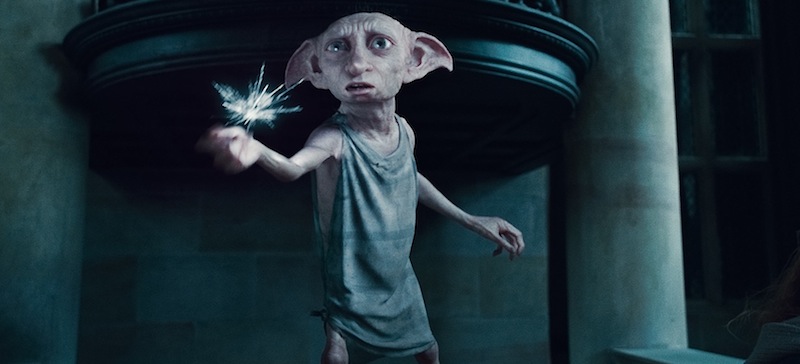
Don’t let the title of today’s MindFood entry deceive you: I love the Harry Potter film franchise.
With theatrical and DVD/Blu-ray re-watches, it’s a conservative estimate to say that, between all eight films, I’ve journeyed to Hogwarts at least 30 times, easy. I think the longest gap I’ve gone without finding a good reason to watch one of the Potter films since Sorcerer’s Stone came out in 2001 is 6 months. There are only two other film franchises that have earned that kind of rewatchability for me, but not even Star Wars and Indiana Jones have gotten that much play in my adult life. So, yeah, I’m a big Potter fan.
Here’s the rub, though: I also love the Harry Potter books. Point of fact, I love J.K. Rowling’s books more than I do the movies, and therein lies the dilemma. As astounding as these films have been over the last decade, I would hate to see them be the only Harry Potter films ever made. No, I’m not talking about wanting to see Warner Bros.’ dream up the further adventures of the boy who lived (though that would be lovely); I’m talking about wanting remakes.
We all know it’s inevitable. Sure, Warner Bros. has dumped hundreds upon hundreds of millions of dollars into these films and it’s netted them billions upon billions in returns, but it’s only a matter of time before they’ll be itching to find a new way to cash in on the franchise. The question is, what’s the appropriate amount of time that has to pass before Harry Potter can be remade? What’s the grace period where it’ll no longer seem like a blatant money grab? How many generations need to be born before a new cohort can be capitalized on?
It’s tough to even ponder simply because there is no precedent. Sure, individual movies are remade every day in Hollywood and several franchises have been given a well received resurgence with reboots, but there’s never been anything of this scale before. It’ll take extremely careful calculation on the part of the studio, but there’s no question that this needs to be done.
Why? Because Harry Potter deserves to be given a better adaptation. Again, I’m not saying that they’re all bad movies, there’s just no way these should be allowed to become the definitive Potter films. They’ve just left out too much of the truly awesome potential packed densely into those not-so-little books. It’s not the movies’ fault, either. When Warner Bros. gave the green light to Harry Potter and the Sorcerer’s Stone there was absolutely no predicting that the series would explode globally, uniting millions of people of all ages in a feverous love for that wonderful wizarding world. Hell, not all of the books had even been written yet. Because of this, there just wasn’t enough planning put in place to do everything just right.
Frankly it’s amazing that these films were able to adapt and maintain such a high level of quality given what they were up against. If you watch any of the “making of” materials, each director introduced new aspects to the design of the world. Some were improvements, some were abandoned, but all of them shook up continuity. Example: Hogwarts changes size and shape between the films, and while evolving architecture may seem like a particularly nerdy thing to complain about, by the time we get to the battle of Hogwarts in Deathly Hallows Part 2, that inability to establish and stick with a consistent sense of geography really cripples things (it’s still a beautiful sequence, but it doesn’t come close to what’s captured in the book).

So for logistical reasons alone it would be a huge, huge benefit to the unified quality of the films to rebuild everything with full access to the now-completed blueprints, but there’s also the issue of introducing all the stuff that was left out of the movies. I’m not talking about stuff like Hermione fighting for equal rights for house elves, I’m talking crucial plot points and character traits that just never made it to the big screen: Dobby finding the Room of Requirement and always being there for Harry (there’s no way his final scene in the films has any significant impact on non-readers); the Sorting Hat’s ominous and unprecedented speech at the beginning of Order of the Phoenix; the bumbling of Neville’s arc, particularly his history with the Death Eaters; the students versus the Death Eaters at the end of Half-Blood Prince— the list goes on and on (and is only added to by Deathly Hallows Part 2).
These absences didn’t bother me so much because I’ve read the books three times each, but they’re required reading to understand the nuances of the last few films. While I heartily encourage reading, when it comes to filmmaking, it’s never a good thing if a film requires any outside materials for full appreciation. Everything you need to know should be up there on the screen and that just isn’t the case with Potter. They’re impressive screenplays, but they do take advantage of the audience’s assumed knowledge of the source material too heavily, unfortunately making them imperfect films. Of course, the final question would be can anyone ever even make a perfect adaptation of the complete Potter saga?
But that’s a question for another day…


